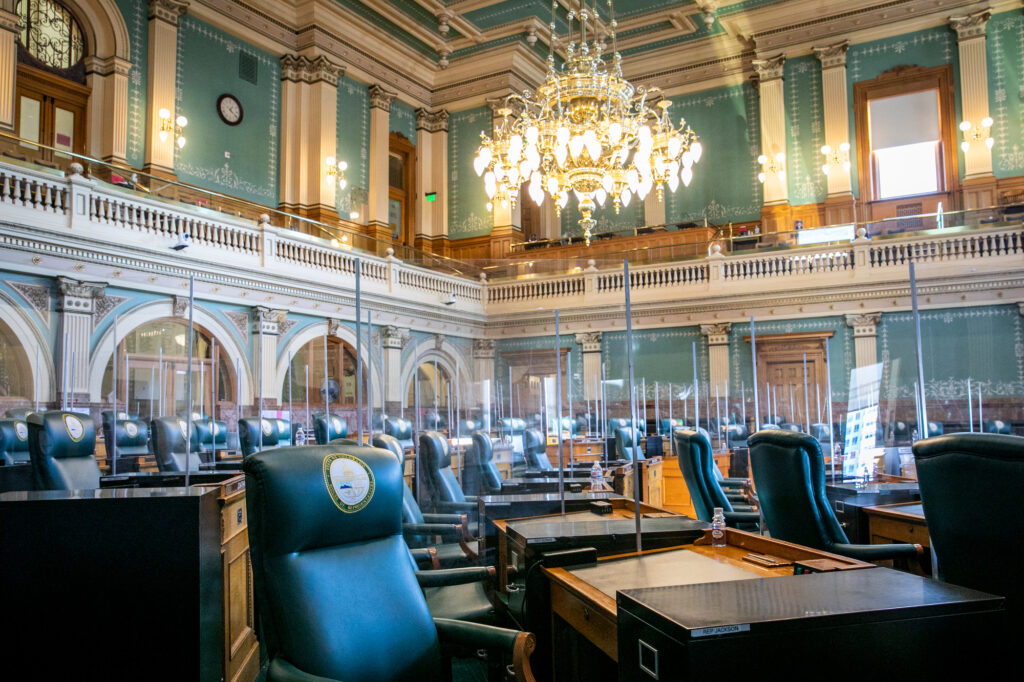“I’m seeing people I love and care about deeply wondering what’s going to happen,” said Carly Sargent-Knudson, a 35-year-old dance teacher in Boulder. “I’m worried. Small businesses are really struggling. Whatever funds, if any, they had from the federal government are running out.”
 Hart Van Denburg/CPR News
Hart Van Denburg/CPR News
A special state legislative session for COVID-19 relief
Instead, Colorado state lawmakers are rushing to plug the gap with the money they have. This week, Colorado’s legislature will meet in a special session to craft a kind of miniature stimulus package worth $200 million to $400 million.
The rough plans include the following items, although the details could change:
- Up to $2,000 per month in state sales tax relief for individual restaurants, totaling about $50 million
- $55 million in grants for small businesses that are affected by capacity restrictions
- Roughly $50 million to help pay people’s rent and mortgage bills
- About $50 million in support for childcare centers that have been marooned by the shift to remote work
- $20 million in grants to help K-12 schools provide broadband internet access to low-income families and staff
Gov. Jared Polis also asked lawmakers to work on providing assistance with utility bills, food and public health. The legislature could tackle some of that in the regular legislative session scheduled to begin in January 2021.
The money is available in part because the state’s economy is doing better than expected after the initial crash — but legislators warn that it’s not nearly enough to replace a second long-awaited federal package, which is still being debated by Congress and the incoming Biden administration.
“I think many people are expecting more than the state is capable of delivering,” said state Sen. Dominick Moreno, a member of the Joint Budget Committee. The state’s financial firepower is “nowhere near” what the federal government can do, he said.
For comparison, the federal government sent more than $2 billion in direct funding to Colorado through the CARES Act. At the peak of the federal stimulus spending, federal unemployment payments in Colorado for a single week would easily outweigh the sum that state lawmakers plan to allocate in the special session.
Still, Moreno and other state leaders say the state stimulus could help prevent deeper economic damage before federal leaders return to work in a Biden administration.
And, so far, the state plans seem to have bipartisan support.
“Senate Republicans are generally supportive of what the governor’s outlined. They stand ready to work on those issues,” said Senate Minority Leader Chris Holbert. He described the special session as a way to use unexpected revenue to benefit the state.
“We aren't deficit spending and we don't have an accumulating state debt,” he said.
Senate Majority Leader Steve Fenberg expected most of the debate to be about funding amounts, not the overall priorities.
“I think there will be some squabbles between Republicans and Democrats about little pieces and the overall numbers,” he said.
 Hart Van Denburg/CPR News
Hart Van Denburg/CPR News
Business owners, workers and care providers are anxious for relief
Outside the Capitol, there’s been a range of reactions.
Amber Bilby, a home child-care provider in Arvada, said that the proposed grants to child care facilities could be crucial — depending on how the money is divvied up. Child-care professionals face higher costs and fluctuating demand, she said.
“My questions right now are on the amount, if it will really help,” she said.
Andrea Chiriboga-Flor, a leader with the worker advocacy group 9to5 Colorado, said that she agreed with the focus of the state stimulus, but wanted to see broader changes on topics like police defunding and affordable housing.
“Yes, we need to stop the bleeding, and hopefully this agenda will help with that, but we also can't afford to be short-sighted — not again,” she wrote in an email.
Paula Cole, an economist with the University of Denver, said that Polis had identified priorities that would boost vulnerable people and industries.
“I’m optimistic about the plans,” she said.
But she urged lawmakers to also focus on improving health care for lower-income people in the months ahead.
“The reality is, a large portion of our population is going to have had COVID-19, and the financial costs that come with that,” Cole said.
She's also concerned about the pandemic’s stark effects for women, who are concentrated in affected industries and who are disproportionately stepping back from work to care for children.
“The reality is we are limited in Colorado in terms of what we can do, what we can spend, because of TABOR,” Cole said. “I think in a national crisis like this, we need a national response.”
Meanwhile, workers and businesses are waiting for the help they can get. Andrea Hull plans to apply for the state’s mortgage assistance program, which is set to receive new funding in the special session.
"try" - Google News
November 29, 2020 at 06:00PM
https://ift.tt/2KHglKW
Unemployment And Housing Benefits Are Expiring. Colorado Will Try To Stop The Bleeding With A Modest Stimulus - Colorado Public Radio
"try" - Google News
https://ift.tt/3b52l6K
Shoes Man Tutorial
Pos News Update
Meme Update
Korean Entertainment News
Japan News Update
Bagikan Berita Ini














0 Response to "Unemployment And Housing Benefits Are Expiring. Colorado Will Try To Stop The Bleeding With A Modest Stimulus - Colorado Public Radio"
Post a Comment